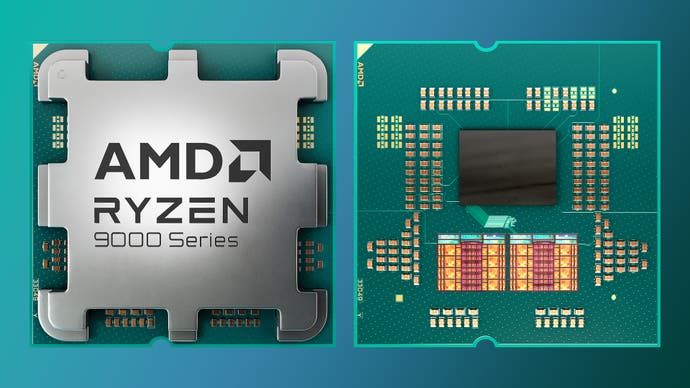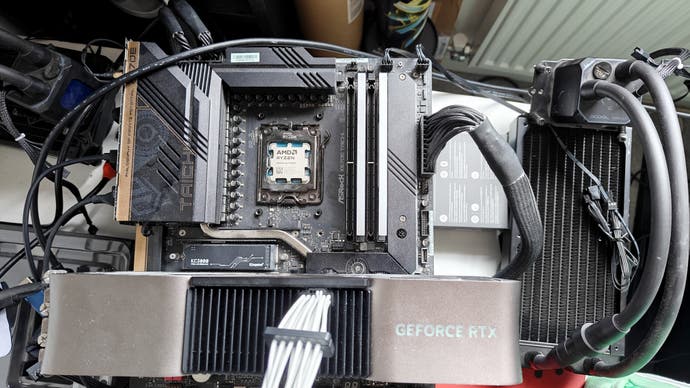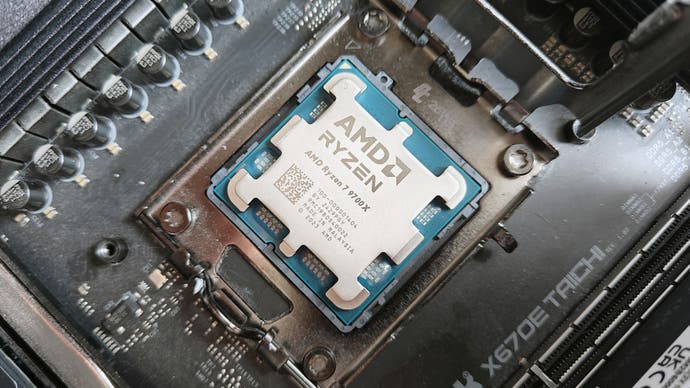AMD Ryzen 5 9600X and Ryzen 7 9700X review: Zen 5 impresses, but 7800X3D still reigns for gaming
What does the scouter say about its power level?
AMD's Ryzen 9000 CPUs have arrived, marking the debut of the more powerful and efficient Zen 5 architecture and a quartet of Dragon Ball Z meme-adjacent processor numbers: 9600X, 9700X, 9900X and 9950X. Today we're looking at the first two processors, the six-core 9600X at £269/$279 and eight-core 9700X at £339/$359. These mainstream offerings are due to go on sale on August 8th, with the 12-core and 16-core Ryzen 9 models scheduled to arrive one week later.
With faster-in-games X3D variants rumoured for later this year and heavily discounted Ryzen 7000 parts already on the market, are the new Ryzen 9000 models worth picking up in the meantime? And how do these processors compare to the high-flying Ryzen 7 7800X3D, which we've been recommending as the best high-end gaming CPU?
To find out, we've tested these processors and some of their closest AMD and Intel rivals in a gauntlet of demanding games from 1080p to 4K, plus taken a look at synthetic and content creation benchmarks to get an idea of whether these new Ryzen 9000 processors offer a noticeable improvement over their predecessors.

We expect to see a fair uptick in most workloads, with AMD's figures showing an average 16 percent increase to IPC (instructions per clock, an indicator of single-core grunt) at similar clockspeeds to the outgoing Ryzen 7000X CPUs and on the same AM5 socket and 700-series motherboards. (AMD has also announced X870 and X870E motherboards with USB 4 as standard and faster memory support, but we haven't received these for testing just yet.)
The speed gains here are achieved through a combination of architectural improvements (such as an improved branch predictor, better AVX-512 support and doubled data bandwidth between L2 to L1 caches) and the switch to a more efficient 4nm CCD. That means we should expect better power efficiency from the new cores, and indeed the parts are all rated at lower TDPs than their Ryzen 7000 predecessors (65W vs 105W for Ryzen 5/7).
Finally, improved thermal resistance means that temperatures at the same TDP ought to be lower too - AMD claims a 7°C reduction at matched TDPs, which is impressive stuff.
| CPU design | Boost | Base | L3 cache | TDP | RRP | |
|---|---|---|---|---|---|---|
| Ryzen 9 9950X | Zen 5 16C/32T | 5.7GHz | 4.3GHz | 64MB | 170W | $649 |
| Ryzen 9 9900X | Zen 5 12C/24T | 5.6GHz | 4.4GHz | 64MB | 120W | $499 |
| Ryzen 7 9700X | Zen 5 8C/16T | 5.5GHz | 3.8GHz | 32MB | 65W | £339/$359 |
| Ryzen 5 9600X | Zen 5 6C/12T | 5.4GHz | 3.9GHz | 32MB | 65W | £269/$279 |
| Ryzen 9 7950X3D | Zen 4 16C/32T | 5.7GHz | 4.2GHz | 128MB | 120W | $699/£699 |
| Ryzen 9 7950X | Zen 4 16C/32T | 5.7GHz | 4.5GHz | 64MB | 170W | $699/£739 |
| Ryzen 9 7900X3D | Zen 4 12C/24T | 5.6GHz | 4.4GHz | 128MB | 120W | $599/£599 |
| Ryzen 9 7900X | Zen 4 12C/24T | 5.6GHz | 4.7GHz | 64MB | 170W | $549/£579 |
| Ryzen 9 7900 | Zen 4 12C/24T | 5.4GHz | 3.7GHz | 64MB | 65W | $429/£519 |
| Ryzen 7 7800X3D | Zen 4 8C/16T | 5.0GHz | 4.2GHz | 96MB | 120W | $449/£375 |
| Ryzen 7 7700X | Zen 4 8C/16T | 5.4GHz | 4.5GHz | 32MB | 105W | $399/£419 |
| Ryzen 7 7700 | Zen 4 8C/16T | 5.3GHz | 3.8GHz | 32MB | 65W | $329/£349 |
| Ryzen 5 7600X | Zen 4 6C/12T | 5.3GHz | 4.7GHz | 32MB | 105W | $299/£319 |
| Ryzen 5 7600 | Zen 4 6C/12T | 5.1GHz | 3.8GHz | 32MB | 65W | $229/£249 |
| Ryzen 5 7500F | Zen 4 6C/12T | 5.0GHz | 3.7GHz | 32MB | 65W | $200/£255 |

We're using a similar physical setup to our previous Ryzen 7000 testing, including the ASRock X670E Taichi motherboard, G.Skill Trident Z5 Neo DDR5-6000 CL30 RAM and an Eisbaer Aurora 240mm AiO. The big difference is that our RTX 3090 has been swapped out for an RTX 4090 Founders Edition, providing a surfeit of extra graphics performance that should push modern CPUs even harder.
While Ryzen 9000 is the star of the show, we also tested a selection of earlier Ryzen 3000 and 5000 processors and Intel's more mainstream 14th-gen processors. Our Intel CPU testing was performed on the Gigabyte Aorus Z790 Master using the same DDR5-6000 CL30 RAM, while AM4 CPUs were tested on the classic Asus ROG Crosshair 8 Hero with a Trident Z Royal DDR4-3600 CL16 kit.
For storage, we're using a 4TB Lexar NM790 PCIe 4.0 NVMe SSD and 4TB Kingston KC3000. Our rig is completed with a 1000W Corsair RM1000x power supply. Testing was performed with the latest Windows updates (23H2), chipset drivers and BIOS revisions (3.06 for the ASRock AM5 board) installed.
| Cinebench 2024 (10m) | Single-core | Multi-core |
|---|---|---|
| Ryzen 5 3600X | 77 | 578 |
| Ryzen 5 7600X | 114 | 845 |
| Ryzen 7 7700X | 118 | 1127 |
| Ryzen 7 7800X3D | 112 | 1074 |
| Ryzen 5 9600X | 132 | 935 |
| Ryzen 7 9700X | 130 | 1172 |
| Ryzen 7 9700X (105W) | 136 | 1280 |
| Intel Core i5 14600K | 120 | 1400 |
| Intel Core i7 14700K | 127 | 1987 |
Content creation benchmarks serve two purposes here. First, they serve as synthetic benchmarks with useful differentiation between single-core and multi-core results, allowing us to see where new CPUs lie versus their rivals and where they seek to gain their advantages. Secondly, they're of course useful to show real-world performance in similar workloads, with Cinebench simulating the 3D modelling and animation program Cinema 4D, while Handbrake is literally just transcoding an early DF Patreon video - a common task for anyone that works with video.
Let's look at the Cinebench 2024 results first. This is the first time we've used this test, which loops for at least ten minutes to ensure processors aren't able to quickly knock in a good score before thermal or power limits kick in. This makes for a long total run time, especially with the task given over to a single CPU core, but it is a reasonable upgrade given the power of modern CPUs.
Here, the 9600X and 9700X do give a good account of themselves, showing a 16 percent and 18 percent improvement over their last-gen predecessors in single-core scores - very close to the 16 percent average in IPC AMD measured in their own benchmarks. Multi-core returns are a little more modest, with improvements of 11 percent and just four percent for the 9600X and 9700X respectively.
| Cinebench R20 | Single-core | Multi-core |
|---|---|---|
| Ryzen 5 3600X | 485 | 3654 |
| Ryzen 5 7600X | 744 | 5814 |
| Ryzen 7 7700X | 758 | 7609 |
| Ryzen 7 7800X3D | 688 | 6988 |
| Ryzen 5 9600X | 850 | 6358 |
| Ryzen 7 9700X | 862 | 7851 |
| Ryzen 7 9700X (105W) | 863 | 8908 |
| Intel Core i5 14600K | 777 | 9420 |
| Intel Core i7 14700K | 818 | 13614 |
I did notice that the CPU was only maxing out at 62°C in these tests, so I tested at a higher 105W TDP using PBO in the BIOS - and did extract more performance at the cost of temperature.
Cinebench R20 is a legacy test for us, having run in a huge number of previous CPU reviews, and so we thought it was worth running as well in case you wanted to go back and compare results. We saw similar margins here gen-on-gen (+14 percent single-core for both Ryzen 9000 CPUs), but it's worth noticing the Intel threat too.
The 14600K delivers a 9420 point multi-core score, which the 14700K ups to 13614 - and Intel's best in the Ryzen 7 category hits only 7851 at the stock 65W TDP, or 8908 after the TDP limits are raised to 105W. This is down to a few factors, most notably higher core counts for the Intel CPUs, including 14 cores for the 14600K (6P+8E) and 20 for the 14700K (8P+12E) versus the six-core and eight-core 9600X and 9700X. Intel motherboards are also typically more aggressive when it comes to power delivery at stock settings, which is particularly helpful for these sorts of all-core workloads but does result in higher energy consumption and more heat to dissipate.
| Handbrake | H264 (fps) | HEVC (fps) |
|---|---|---|
| Ryzen 5 3600X | 26.66 | 10.80 |
| Ryzen 5 7600X | 41.29 | 18.31 |
| Ryzen 7 7700X | 53.27 | 23.65 |
| Ryzen 7 7800X3D | 49.63 | 21.54 |
| Ryzen 5 9600X | 42.51 | 19.77 |
| Ryzen 7 9700X | 51.80 | 23.79 |
| Ryzen 7 9700X (105W) | 58.87 | 26.98 |
| Intel Core i5 14600K | 59.42 | 25.39 |
| Intel Core i7 14700K | 80.26 | 31.07 |
Our final test is the Handbrake transcode test, where we convert an 822MB 4K video file using the H264 and H265 codecs using the Production Standard preset set to CRF 18. We're using the most recent version of Handbrake here, 1.8.1.
These transcode results show the first slightly worrying signs of underperformance, with the H264 benchmark running just three percent faster on the 9600X versus the 7600X, though the H265 benchmark speeds up by around eight percent - perhaps due to those AVX architectural improvements. The 9700X is even weirder, actually dropping nearly three percentage points versus the 7700X in the H264 test - something that persisted through multiple retests. Normalcy is restored in the HEVC test, albeit by just one percent.
Increasing the 9700X's TDP to 105W in the BIOS allows for more meaningful improvement, to the tune of 14 percent over the stock 7600X - but it comes with higher temperatures, in the 80s and low 90s versus the low 60s we saw at stock power limits.
With our content creation benchmarks completed, let's move onto the main event: our game benchmarks.

